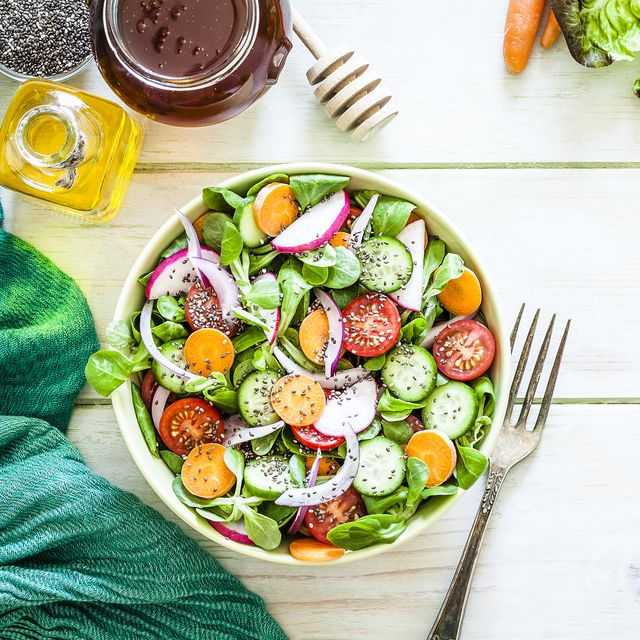- Eating one cup of raw, nitrate-rich vegetables such as leafy greens and beetroot—that’s just a half a cup cooked—can improve many markers of heart health, new research shows.
- Nitrate-rich vegetables have also been shown to improve cardio performance as well.
- Beetroot, arugula, pak choi (a.k.a. bok choy), endive, and radish greens, as well as your typical dark leafy choices are all great options to regularly add to your diet.
One of the most repeated pieces of nutrition advice for cardiovascular health is to eat dark, leafy greens like kale, chard, and spinach regularly. But how much do you need to eat in order to see benefits? According to a new study in the European Journal of Epidemiology, the answer is: probably a lot less than you think.
Researchers looked at data from over 53,000 people who took part in the Danish Diet, Cancer, and Health Study, which tracked health outcomes and food consumption over a 23-year period.
→ Stay on top of the latest health and nutrition news with Runner’s World+!
They found that people who ate one cup of raw, nitrate-rich vegetables such as leafy greens and beetroot—that’s just half a cup cooked—had a lower systolic blood pressure (the top number, which measures the pressure in your arteries when your heart beats) by about 2.5 mmHg (millimeters of mercury). Additionally, they had a 12 percent, 15 percent, 17 percent, and 26 percent lower risk of being hospitalized with heart disease, heart failure, stroke, and peripheral artery disease (a condition where narrowed arteries reduce blood flow to your limbs), respectively.
The reason? The study authors cite an increased amount of nitric oxide. When you consume nitrates, your body converts them into nitric oxide. Nitric oxide causes your blood vessels to relax and dilate, which lowers your blood pressure.
If only a half-cup of cooked greens has this effect, does that mean you should load up to get even greater benefits? That’s not necessary, the researchers added. Eating more than that daily didn’t seem to confer any additional advantages. That means boosting your nitrate intake through supplements may be inadvisable, they concluded.
The study adds to other research associating nitrate-rich vegetables with major heart health effects, as well as better exercise efficiency. For example, a 2018 study in the European Journal of Clinical Nutrition found that increased consumption of dietary nitrates lowered both systolic and diastolic blood pressure (the bottom number, which measures the pressure in your arteries when your heart rests between beats) providing cardio-protective effects that may boost performance.
The lead researcher of that study, Cindy van der Avoort, Ph.D.(c), at the Institute of Sport and Exercise Studies at HAN University of Applied Sciences in the Netherlands, told Bicycling that more effective blood pressure regulation can help with endurance by improving heart health overall.
Also, she added, you have plenty of choices when it comes to what to eat for your nitrate fix. Beetroot has the highest nitrate amount, but other options include arugula, pak choi (a.k.a. bok choy), endive, and radish greens, as well as your typical dark leafy choices. Even dried cranberries and nuts can contribute some nitrate to a meal.
Considering how little it takes to get your daily nitrate amount—and the breadth of choices available—it’s worth putting leafy greens into your heart health mix.
Elizabeth Millard is a freelance writer focusing on health, wellness, fitness, and food.













